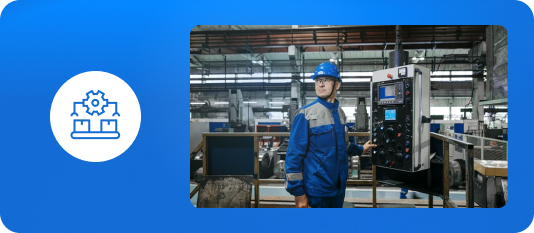-
Company
-
Sectors

-
IT solutionsIT solutions
-
Cybersecurity

-
IT infrastructure

- Apollo ECI
- Data Center
- ECI Telecom
- Neptune ECI
- LAN and WiFi network systems
- Hosting services
- Backup systems
- OT network systems
- IT consulting
- Servers, arrays, networks
- Outsourcing services
- Guaranteed power supply systems
- Low-current installations
- Computer and printing equipment
- Service contracts
- Cloud services
- Virtualization
-
ERP and BI systems

-
Systems for production

-
Warehouse management systems (WMS)

-
Personnel and HR systems

-
Systems for universities

- University Study Management System
- Teta EDU
- Student e-file
- Online Candidate Registration
- OPTiDrop App
- Student Extranet
- Electronic Attendance List
- System of Academic Career Offices
- Electronic Room Reservation System
- OPTicamp academic teacher electronic ID card
- OPTicamp electronic PhD student ID card
- OPTicamp electronic student ID
-
Workflow and applications

-
CMS system and websites

-
Chatbots

-
Web platforms and applications

-
Other technologies


-
-
Knowledge
-
Contact
Just-in-time production: IT solutions that support effective planning and management
The just-in-time concept, although it has existed since the middle of the last century, perfectly fits the specific nature of the modern market. It assumes rapid production in line with actual demand while simultaneously reducing waste during the production process. However, to achieve these goals, it is necessary to implement IT solutions dedicated to production.
"Just in time." In practice, the just-in-time concept boils down to delivering raw materials in line with the needs arising from the production process—that is, those actually needed, in the specified quantity, and at the right time. This approach eliminates waste by preventing unnecessary storage of both materials and finished products. However, implementing this concept also improves work organization and streamlines information flow. Therefore, IT technology is a key element in this case.
IT infrastructure in production
It's hard to imagine a manufacturing company today without IT tools to support its production operations. The key IT solution is typically an ERP system, enhanced with modules and functionalities that streamline production process planning and coordination. However, in addition to this class of solution, other tools are also used.
Among the most important seem to be:
- a WMS system, which, in conjunction with data collectors, provides information about what has just arrived at the warehouse,
- an MES system, which is responsible for ongoing reporting on order fulfillment directly from the production floor.
The IT infrastructure in a modern manufacturing enterprise can therefore consist of several systems, which, when integrated, enable full control at every stage – from planning, through product production, to sales.
Features and functionalities of IT systems for manufacturing
Modern IT systems are gaining more and more functionality, enabling them to increasingly implement just-in-time production. This is the case with TimeLine ERP software, which includes highly specific modules that facilitate the management of numerous manufacturing processes. Furthermore, these modules are functionally tailored to the needs of many different industries (e.g., automotive, foundry, plastics), which is crucial for production efficiency. Implementing these functionalities allows us to answer key questions in the context of just-in-time: "When, in what quantities, and what raw materials and semi-finished products are needed to meet the production plan?"
When it comes to warehouse WMS systems, in addition to basic functionalities such as warehouse receipts and releases, inter-warehouse transfers, and inventory, manufacturing companies are increasingly utilizing the unique features of this software. This primarily involves labeling semi-finished products, finished goods, or bulk packaging, which allows for full traceability throughout the supply chain. Another key WMS functionality is quality control, both at the warehouse's inlet and outlet.
The functionalities characteristic of modern WMS systems partially overlap with other IT solutions used in manufacturing. An example is production reporting, which is most often performed using an MES system.
Through integration with machines, an MES system enables ongoing monitoring of work in progress, including individual processes. All data is collected and delivered in real time, enabling rapid response. In the context of practical application of the just-in-time concept, an MES system facilitates optimal planning of the degree and sequence of machine utilization, facilitating effective maintenance. An MES system can be a standalone tool within the IT infrastructure, but it can also be an integral component of a comprehensive production management system – as is the case with TimeLine ERP software.
IT solutions and the just-in-time concept in practice
Adapting production to market needs and optimizing supply logistics are steps that reduce costs associated with unnecessary storage of both raw materials and finished goods. Utilizing IT solutions to support the just-in-time manufacturing process offers benefits to every industry. The automotive industry is a prime example, where the widespread adoption of the just-in-time concept stemmed primarily from the positive experiences of brands such as Ford and Toyota, which were the first to introduce it into production management. Currently, the increasing complexity of modern vehicles (the number of parts and variants available) forces manufacturers to limit their current inventories of parts and components. Therefore, management based on the just-in-time concept, supported by an IT infrastructure comprised of numerous innovative systems, seems to be the right approach.
Other industries where implementing just-in-time and dedicated systems brings tangible benefits include electronics manufacturing, where reducing inventory, which generates relatively high costs, frees up capital tied up for this purpose. The food industry is also worth mentioning, where the use of the discussed methods and tools is somewhat forced upon them by customers – most often large retail chains expecting order fulfillment within 18 hours of order placement. Due to the short shelf life of manufactured products, production must be carried out on an ongoing basis, in line with market needs. Therefore, optimizing warehouse space for finished products, which must be ready for shipment practically directly from the production floor, becomes crucial. Therefore, implementing the concept of "just-in-time delivery" and supporting IT solutions – even those consisting of several integrated tools (ERP system, APS system, dedicated production management solution) – seems particularly beneficial in this situation.
Related articles
Polityka prywatności
Klauzula Informacyjna - przetwarzanie danych osobowych w OPTeam S.A.
Ochrona prywatności użytkowników Internetowych serwisów OPTeam SA jest dla nas bardzo ważna.
Niniejsza polityka zawiera informacje dotyczące gromadzonych danych oraz zasad ich przetwarzania i wykorzystywania we wszystkich serwisach www prowadzonych i utrzymywanych przez OPTeam SA. Wykorzystanie i zbieranie informacji o użytkownikach Internetowych serwisów ograniczane jest do niezbędnego minimum wymaganego do świadczenia przez OPTeam SA usług na najwyższym poziomie. Polityka prywatności zawiera informacje na temat narzędzi stosowanych przez OPTeam SA w celu zapewnienia jak największej wygody korzystania z Internetowych serwisów (cookies, logi systemowe) oraz o danych zbieranych przez podmioty zajmujące się analityką serwisów. Polityka określa ponadto w jaki sposób chronimy Twoje dane, jakie prawa Ci przysługują oraz w jaki sposób możesz je wykonywać. Jednocześnie wskazane zostały narzędzia służące do zarządzania wyrażonymi przez Ciebie zgodami.
Jakie dane zbieramy?
OPTeam dokłada wszelkich starań, żeby Internetowe serwisy informacyjne były wygodne w użyciu. Dla zwiększenia wydajności serwisów stosowana jest technologia anonimowych cookies oraz pobierane są dane statystyczne o najczęściej poszukiwanych, za pomocą wyszukiwarki frazach, dzięki czemu aktualizowana jest na bieżąco nawigacja serwisu, żeby wyszukiwanie treści było wygodne i intuicyjne.
Przetwarzamy dane, żeby:
- dopasować prezentowane treści do potrzeb i zainteresowań użytkowników,
- zapewnić bezpieczeństwo usług,
- prezentować informacje o produktach i usługach dopasowane do potrzeb i zainteresowań użytkowników,
- dokonywać pomiarów, które pozwalają udoskonalać oferowane produkty i usługi.
Cookies (ciasteczka).
Serwis nie zbiera w sposób automatyczny żadnych informacji, z wyjątkiem informacji zawartych w plikach cookies.
- Pliki cookies (tzw. "ciasteczka") stanowią dane informatyczne, w szczególności pliki tekstowe, które przechowywane są w urządzeniu końcowym Użytkownika Serwisu i przeznaczone są do korzystania ze stron internetowych Serwisu. Cookies zazwyczaj zawierają nazwę strony internetowej, z której pochodzą, czas przechowywania ich na urządzeniu końcowym oraz unikalny numer.
- Podmiotem zamieszczającym na urządzeniu końcowym Użytkownika Serwisu pliki cookies oraz uzyskującym do nich dostęp jest OPTeam SA, Tajęcina 113, 36-002 Jasionka.
- Pliki cookies wykorzystywane są w celu:
- dostosowania zawartości stron internetowych Serwisu do preferencji Użytkownika oraz optymalizacji korzystania ze stron internetowych; w szczególności pliki te pozwalają rozpoznać urządzenie Użytkownika Serwisu i odpowiednio wyświetlić stronę internetową, dostosowaną do jego indywidualnych potrzeb;
- tworzenia statystyk, które pomagają zrozumieć, w jaki sposób Użytkownicy Serwisu korzystają ze stron internetowych, co umożliwia ulepszanie ich struktury i zawartości
- utrzymanie sesji Użytkownika Serwisu (po zalogowaniu), dzięki której Użytkownik nie musi na każdej podstronie Serwisu ponownie wpisywać loginu i hasła.
- W ramach Serwisu stosowane są dwa zasadnicze rodzaje plików cookies: "sesyjne" (session cookies) oraz "stałe" (persistent cookies). Cookies "sesyjne" są plikami tymczasowymi, które przechowywane są w urządzeniu końcowym Użytkownika do czasu wylogowania, opuszczenia strony internetowej lub wyłączenia oprogramowania (przeglądarki internetowej). "Stałe" pliki cookies przechowywane są w urządzeniu końcowym Użytkownika przez czas określony w parametrach plików cookies lub do czasu ich usunięcia przez Użytkownika.
- W ramach Serwisu stosowane są następujące rodzaje plików cookies:
- "niezbędne" pliki cookies, umożliwiające korzystanie z usług dostępnych w ramach Serwisu, np. uwierzytelniające pliki cookies wykorzystywane do usług wymagających uwierzytelniania w ramach Serwisu;
- pliki cookies służące do zapewnienia bezpieczeństwa, np. wykorzystywane do wykrywania nadużyć w zakresie uwierzytelniania w ramach Serwisu;
- "wydajnościowe" pliki cookies, umożliwiające zbieranie informacji o sposobie korzystania ze stron internetowych Serwisu;
- "funkcjonalne" pliki cookies, umożliwiające "zapamiętanie" wybranych przez Użytkownika ustawień i personalizację interfejsu Użytkownika, np. w zakresie wybranego języka lub regionu, z którego pochodzi Użytkownik, rozmiaru czcionki, wyglądu strony internetowej itp.;
- "reklamowe" pliki cookies, umożliwiające dostarczanie Użytkownikom treści reklamowych bardziej dostosowanych do ich zainteresowań.
- W wielu przypadkach oprogramowanie służące do przeglądania stron internetowych (przeglądarka internetowa) domyślnie dopuszcza przechowywanie plików cookies w urządzeniu końcowym Użytkownika. Użytkownicy Serwisu mogą dokonać w każdym czasie zmiany ustawień dotyczących plików cookies. Ustawienia te mogą zostać zmienione w szczególności w taki sposób, aby blokować automatyczną obsługę plików cookies w ustawieniach przeglądarki internetowej bądź informować o ich każdorazowym zamieszczeniu w urządzeniu Użytkownika Serwisu. Szczegółowe informacje o możliwości i sposobach obsługi plików cookies dostępne są w ustawieniach oprogramowania (przeglądarki internetowej).
- Operator Serwisu informuje, że ograniczenia stosowania plików cookies mogą wpłynąć na niektóre funkcjonalności dostępne na stronach internetowych Serwisu.
- Pliki cookies zamieszczane w urządzeniu końcowym Użytkownika Serwisu i wykorzystywane mogą być również przez współpracujących z operatorem Serwisu reklamodawców oraz partnerów.
- Więcej informacji na temat plików cookies dostępnych jest pod adresem www.wszystkoociasteczkach.pl lub w sekcji "Pomoc" w menu przeglądarki internetowej.
- Strona korzysta z narzędzi analitycznych Google Tag Manager należących do Google LLC, 1600 Amphitheatre Parkway, Mountain View, CA 94043, Stany Zjednoczone, które pozwalają monitorować działania (tzw. zdarzenia) wykonywane przez Ciebie podczas wizyty na Stronie, takie jak np.: kliknięcie w przycisk, przesłanie formularza kontaktowego, pobranie pliku. W tym celu wykorzystywane są pliki cookies Google LLC dotyczące usługi Google Tag Manager. Szczegółowe informacje związane z przetwarzaniem danych przez Google Analytics są udostępnione przez Google na stronie: https://support.google.com/tagmanager/answer/9323295?hl=pl.
- Strona korzysta z narzędzi analitycznych Google Analytics należących do Google LLC, 1600 Amphitheatre Parkway, Mountain View, CA 94043, Stany Zjednoczone, które zbierają informacje na temat Twoich odwiedzin Serwisu, takie jak: wskazanie stron, które wyświetliłeś, czas, jaki spędziłeś na stronie czy przejścia pomiędzy poszczególnymi stronami. W tym celu wykorzystywane są pliki cookies Google LLC dotyczące usługi Google Analytics. Szczegółowe informacje związane z przetwarzaniem danych przez Google Analytics są udostępnione przez Google na stronie: https://support.google.com/analytics/answer/6004245.
- Strona korzysta z narzędzi analitycznych Google Search Console należących do Google LLC, 1600 Amphitheatre Parkway, Mountain View, CA 94043, Stany Zjednoczone, które pomagają monitorować, utrzymywać i rozwiązywać problemy związane z obecnością witryny w wynikach wyszukiwania Google. Szczegółowe informacje związane z przetwarzaniem danych przez Google Search Console są udostępnione przez Google na stronie: https://support.google.com/webmasters/answer/9128668?hl=pl. Wszelkie pozostałe informacje związane z prywatnością i bezpieczeństwem danych gwarantowanych przez Google, można znaleźć pod adresem: https://policies.google.com/privacy?hl=pl.
- Serwis korzysta z narzędzia analitycznego HotJar należącego do HotJar, Level 2, St Julian’s Business Centre 3, Eliza Zmmit Street, St Julian’s ST 1000, Malta, które śledzi Twoje zachowanie podejmowanie w obrębie Serwisu. W tym cellu wykorzystywane sa pliki cookies. Z pomocą HotJar analizowane są zachowania Użytkownika, tj. czas spędzony na poszczególnych stronach, przyciski, w które klika, linki, z których korzysta itp. Więcej informacji odnajdziesz w polityce prywatności HotJar: https://www.hotjar.com/legal/policies/privacy.
- Z narzędzia lead generation Bazo, które identyfikuje ruch na stronie (wizyty na podstronach serwisu). Narzędzie należy do Bazo Sp. z o.o., ul. Bohdana Dobrzańskiego 3, 20-262 Lublin, Regon: 364959893, NIP: 9462661611. Szczegółowe informacje związane z przetwarzaniem danych przez Google Analytics są udostępnione przez Google na stronie: https://bazo.io/pl/polityka-prywatnosci.
- Menadżera Kampanii LinkedIn, systemu reklamowego należacego do Microsoft z siedzibą Redmond, WA 98052-7329 USA. Więcej informacji odnajdziesz w polityce prywatności: https://www.linkedin.com/legal/privacy-policy?trk=homepage-basic_footer-privacy-policy.
- Menadżera Reklam Meta, systemu reklamowego należącego do Facebooka z siedzibą 1 Hacker Way, Menlo Park, CA 94025. Więcej informacji odnajdziesz w polityce prywatności: https://www.facebook.com/privacy/policy/?entry_point=facebook_help_center_ig_data_policy_redirect&locale=pl_PL.
Logi systemów.
Logi systemów, czyli rejestr zdarzeń - utworzony w chronologicznej kolejności zapis informacji o zdarzeniach i działaniach dotyczących strony WWW. Zawierają one takie dane jak adres IP, z którego nastąpiło wejście na daną podstronę, adres tej strony oraz czas połączenia. Logi systemów wykorzystywane są przez OPTeam SA w szczególności w celach statystycznych oraz monitorowania bezpieczeństwa.
Zmiany w polityce ochrony prywatności Internetowych Serwisów Informacyjnych OPTeam.
Na zmiany w Polityce prywatności Internetowych serwisów OPTeam może wpłynąć zmiana technologii internetowej, zmiany powszechnie obowiązujących przepisów prawa, w tym w zakresie ochrony danych osobowych.
Zmiany polityki będą zamieszczane pod adresem http://www.opteam.pl/polityka-prywatnosci.
WŁĄCZANIE / USUWANIE / BLOKOWANIE PLIKÓW COOKIES W INTERNETOWYCH SERWISACH OPTEAM SA.
Internetowe serwisy OPTeam SA korzystają z plików cookies zgodnie z dokonanymi indywidualnie przez Użytkownika ustawieniami przeglądarki internetowej. W wielu przeglądarkach obsługa plików cookies jest domyślnie włączona. Korzystanie z Internetowych serwisów OPTeam SA, bez zmiany ustawień w przeglądarce dotyczących cookies, oznacza potwierdzenie zapoznania się z powyższymi informacjami i akceptację plików cookies. Jeżeli Użytkownik nie akceptuje plików cookies może w dowolnym momencie, w swojej przeglądarce internetowej, zmienić ustawienia lub wyłączyć obsługę plików cookies.
Korzystanie z Internetowych serwisów informacyjnych z włączoną obsługą plików cookies w przeglądarce oznacza, że pliki te zapisane będą w pamięci urządzenia użytkownika.
Więcej informacji na temat plików cookies dostępnych jest w sekcji „Pomoc” w menu przeglądarki internetowej użytkownika lub na poniższych stronach.
- Cookies w przeglądarce Chrome
- Cookies w przeglądarce Firefox
- Cookies w przeglądarce Opera
- Cookies w przeglądarce Safari
- Cookies w przeglądarce Internet Explorer
Użytkownicy, którzy po zapoznaniu się z informacjami dostępnymi w Internetowych serwisach informacyjnych, nie chcą żeby pliki cookies pozostały zachowane w przeglądarce internetowej urządzenia, powinni usunąć je ze swojej przeglądarki po zakończeniu wizyty w Internetowym serwisie informacyjnym.
ADMINISTRATOR DANYCH OSOBOWYCH.
Administratorem danych osobowych jest OPTeam S.A. z siedzibą w Tajęcinie, adres: Tajęcina 113, 36-002 Jasionka w Sądzie Rejonowym w Rzeszowie, XII Wydział Gospodarczy Krajowego Rejestru Sądowego, pod numerem KRS 0000160492, NIP: 813-03-34-531, REGON: 008033000, kapitał zakładowy (kapitał wpłacony) 730 000 zł, Inspektor Ochrony Danych.
W OPTeam S.A. został powołany Inspektor Ochrony Danych, adres: Inspektor Ochrony Danych, Tajęcina 113, 36-002 Jasionka, adres e-mail: odo@opteam.pl.
Udostępnienie danych klienta.
OPTeam SA nie udostępnia danych powiązanych z plikami cookies żadnym podmiotom zewnętrznym.
Necessary cookies help make a website usable by enabling basic functions such as page navigation and access to secure areas of the website. The website cannot function properly without these cookies.
Functional cookies help the website function properly and ensure that the information you need is displayed quickly and accurately when you visit the website.
Statistical cookies help website owners understand how different users behave on the site by collecting and reporting information anonymously.
Marketing cookies are used to track users across websites. The goal is to display advertisements that are relevant and interesting to individual users and therefore more valuable to publishers and third-party advertisers.

